How fear and ‘Everybody Loves Raymond’ convinced Ray Romano to star in Netflix’s ‘Paddleton’
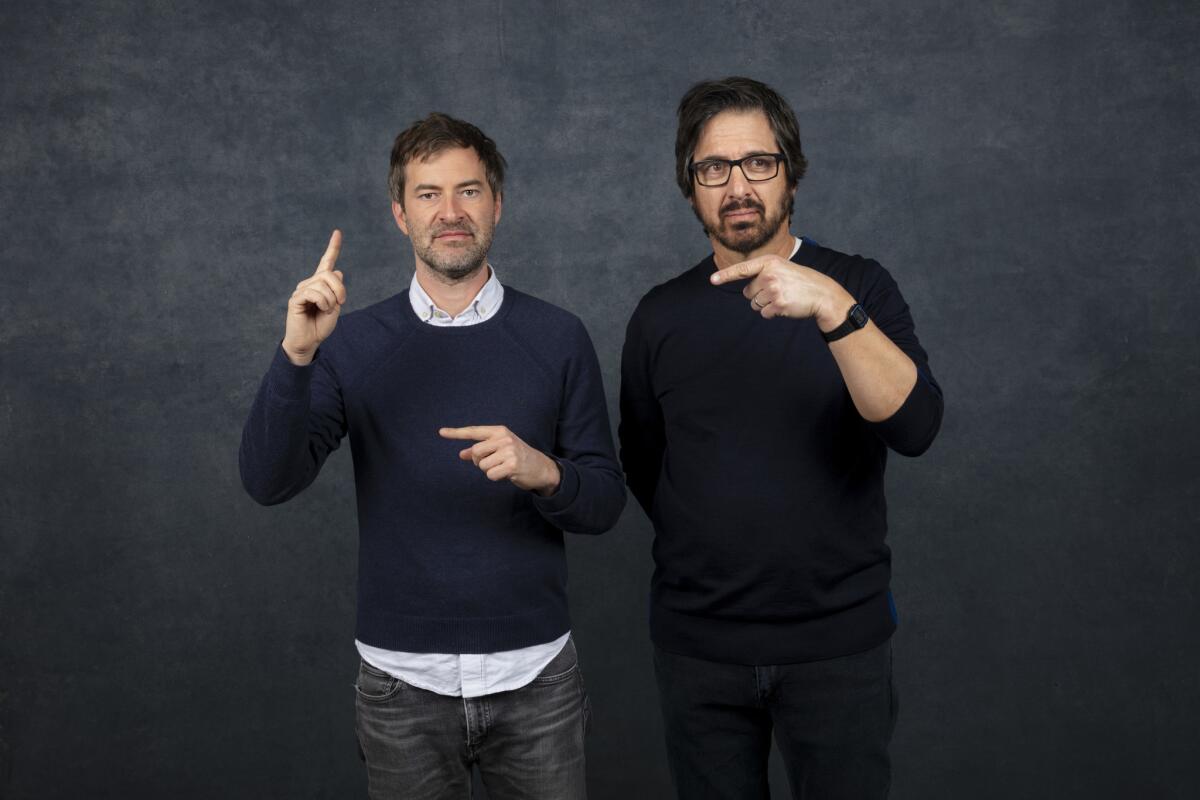
“Paddleton” is the story of two men who really only have each other. Neighbors in a nondescript apartment complex, they both have unfulfilling, dead-end jobs, seemingly no other friends or relations and spend much of their time together, watching kung-fu movies, eating pizza and playing a game of their own invention called “Paddleton.” It’s all provisional, perhaps, but it works. Then one of them is given a diagnosis of terminal cancer.
As portrayed by Mark Duplass and Ray Romano, the characters of Michael and Andy are sweet and unassuming, not particularly articulate with their feelings but deeply aware of the attachment that has grown between the two of them.
Duplass, recently an Emmy winner along with his brother and frequent collaborator Jay Duplass for producing the documentary series “Wild Wild Country,” is also a co-writer of “Paddleton” along with director Alex Lehmann. The film follows up their previous collaboration on “Blue Jay,” which was also made in a semi-improvised style starring Duplass and Sarah Paulson.
For Romano, his role continues a series of serio-comic performances — such as in “The Big Sick” — following the end of his Emmy-winning, long-running sitcom, “Everybody Loves Raymond.” He also recently saw the release of his first stand-up comedy special in nearly 25 years, “Ray Romano: Right Here, Around the Corner.”
Following the premiere of “Paddleton” at the Sundance Film Festival, the movie is being released by Netflix on Feb. 22. Duplass and Romano recently got on the phone to talk about the movie, its unusual production process and unexpected emotional bonds.
Mark, what was it about the process of making “Blue Jay” that made you want to do another project in this same style again?
Mark Duplass: It was a bunch of things. I think that “Blue Jay” was sort of magical for me because it was a movie that leaned all the way into its smallness — a very tiny story, small cast, very intimate — and I was just really happy making it. And, then, when people connected with the movie, it made me feel kind of excited that people still wanted to watch really small movies about small things. So I wanted to go even deeper into that with this movie, and Alex was such a great partner last time, that we figured, let’s take another run at it.
Ray, what appealed to you? Was it the story, the chance to work with Mark or the unusual process?
Ray Romano: Well, kind of all of those things. I was a fan of the Duplass factory, I was enjoying the show “Togetherness” at the time it was on HBO, and I am also into the minutia and the smallness. In “Everybody Loves Raymond,” even though it was a sitcom — and when you think of sitcoms, you think of broad — we did stories that revolved around the little things in a marriage, in a relationship. And things got big, but we liked to explore the little things. So that’s kind of in my wheelhouse and what I’m attracted to. I met Mark for the first time at the “Big Sick” premiere, and he said he had a project that he thought I’d be good doing, and I thought, “Well, it’s showbiz, I’ll probably never hear from him again.”
He said he had a project that he thought I’d be good doing and I thought, ‘Well, it’s showbiz, I’ll probably never hear from him again.’
— Ray Romano, on meeting Mark Duplass
But sure enough, about a week or two later, he sent an outline for the movie. And I don’t know if he told me at the time that it was kind of an outlines, improv-ish kind of project. So that intrigued me, the story intrigued me, and then, when I met with the guys, it kind of sealed the deal for me: the way they operate, how collaborative they were. And it was a little scary. I thought it was a little good to scare myself.
Mark, with “Blue Jay,” you talked about how personal that story was for you, that it was very much you working through these vulnerable feelings that you had about romance and identity. With “Paddleton,” the story touches on mortality and the right to die, but it’s much more about male friendship and male intimacy. What do you feel you were most exploring with this story?
Duplass: Look, I’m 42 now, and there’s no doubt that death was an interesting thing as a person who’s kind of in that mid-life-y place, and that was an interesting entry point. But what was the most meaningful portion of the story, to me, is the study of a very intimate and sweet platonic male relationship. I think I’ve danced around that a bit in our work; I think you see some of that in the way that the two male leads in “Togetherness” related to each other, and it is reflective of my relationships with my friends and with my brother and how I am with men. But often it takes the form of an emotionally evolved, articulate man and I was really excited to do it with these sort of seemingly outlier characters who aren’t full of all the words.
And I guess in particular, for me, it’s this thing that I’m kind of going through, which is I’ve achieved a level of success in my life that I never even dreamed I was going to get to, not only with the career stuff but like how good my marriage is and how good my relationship with my kids is. And, still, I wake up in the morning and I go on Amazon and try to shop for [stuff] to fill in my life and make me happy. And these two guys were so inspiring to me in that they have nothing, their apartments are so not a wish-fulfillment life and they have puzzles and a made-up game and bad pizza and kung-fu movies and each other. And that is a very full, beautiful life for them. So part of it, for me, was the wish fulfillment of playing that, someone who at least on paper has infinitely less than I do, and is probably a lot more fulfilled and happy than I am.
Ray, did you find that too? Male friendships can be very challenging and the fact that these two guys have such a close relationship is really great to see.
Romano: It’s also what makes it so sad and makes you feel for these guys at the end. Andy’s going to lose that one guy, what looks to be a one-in-a-million chance of meeting somebody who he connects with and is a soulmate to. What are the odds that this is going to happen again for this guy? That makes it so heartbreaking. And I like heartbreaking stuff. I don’t know why, but it’s very cathartic for me to feel and to cry. I don’t know if that’s normal. I enjoy things that make me feel that emotion. You just feel for somebody and you kind of connect with them. I feel like, when people can laugh together, they’re bonding. I think when they cry together, they’re bonding. So I’m drawn to things that get deep and make you feel things.
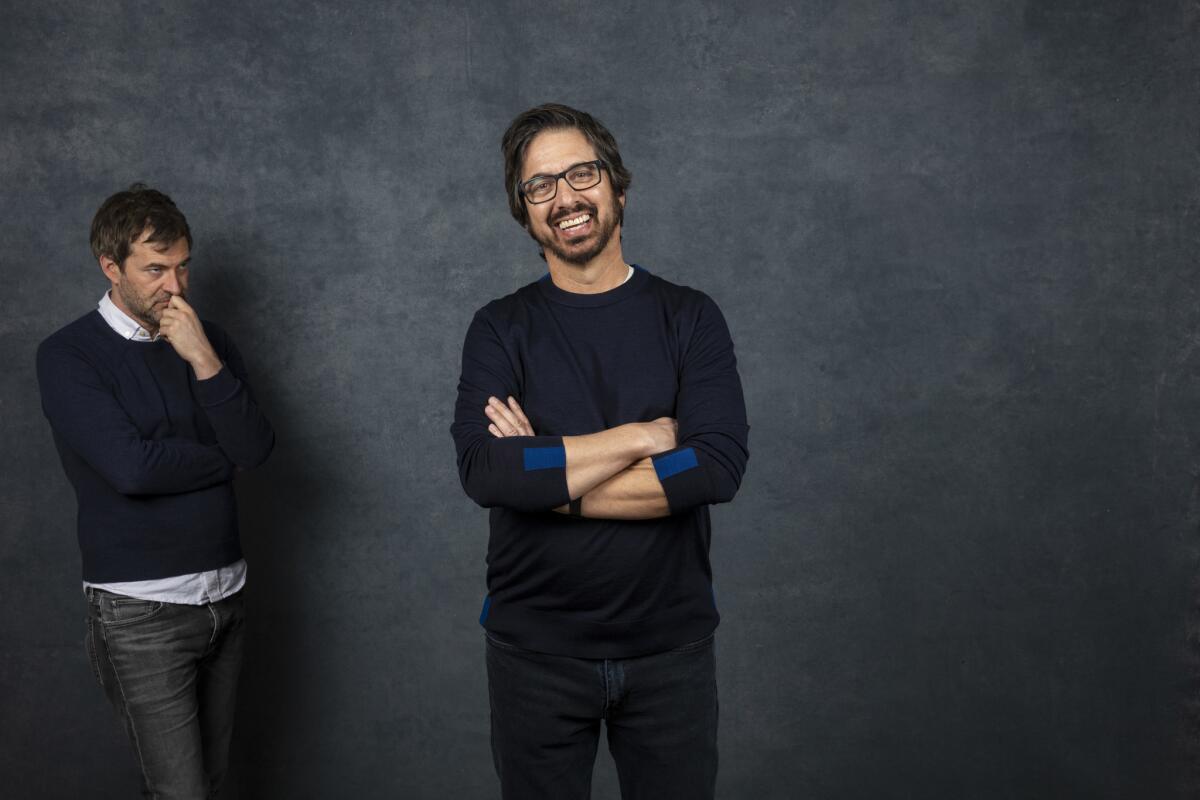
There are a couple of scenes with a female motel manager played by Dendrie Taylor that are really great. At first, she thinks the guys are a couple and later opens up to Andy and makes a pass at him in a hot tub. They’re funny and sweet and really complex. Ray, for you, what are those scenes about?
Romano: Well, I’m gonna be honest here, what they were about, just as far as the outline, it was the uncomfortableness for my character. This woman is something he’s not prepared for. But when people watch that scene, and I’ve asked about it, some people think it’s just his awkwardness in interacting with a woman. And some people think it’s reminding him that he’s going to lose his friend. And either way, I think it works. Whatever they take from it, they were very affected by that scene. Mark, do people actually interpret it differently, what’s going on in that hot tub for Andy?
Duplass: I think it depends on how much people are tracking the platonic love between Michael and Andy versus the journey of Andy. At the end of the day, I think this really is Andy’s story. And if people are there to see a sort of “When Harry Met Sally” between two platonic male friends, they inevitably take that scene as his discomfort about realizing he’s about to go through a similar loss that this woman went through with her husband. And with Andy’s personal journey, he doesn’t know if he’s ever going to connect again and he’s having a lot of shame and discomfort.
And it’s an interesting question because, to me, it is part and parcel with the process of these movies. These movies are not a perfect enactment of a preexisting vision of what they should be. We jump in, we come off the cliff, completely unprepared. We try to find something inspired, start testing them on audiences, and we see what clicks. And in the case of a scene like that, the idea that half the people would walk away with something and half the people would walk away with something different, that’s wonderful. I don’t know how to see a movie in my head in storyboards and go enact that. The only thing I know how to do is the chase.
SIGN UP for the free Indie Focus movies newsletter »
Sundance 2019 Film Festival: See the latest video interviews


Video: Behind the scenes of the L.A. Times 2019 Sundance photo/video studio
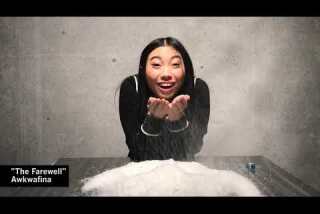
Video: The 2019 Sundance Film Festival Boomerang Supercut

Video: How do you make the most of a small budget?
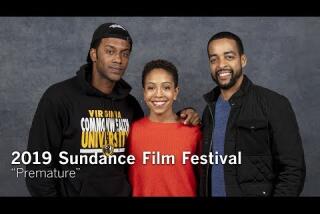
Video: Cast and filmmaker discuss trusting each other while shooting 'Premature'
3:12
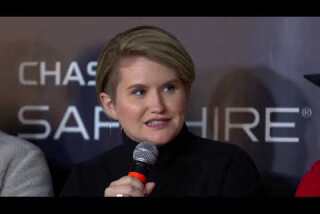
Video: 'Brittany Runs a Marathon' breaks conventions and stereotypes

Video: Jillian Bell is tired of getting scripts about body image issues

Video: Jillian Bell lost 40 pounds for her role in 'Brittany Runs a Marathon'

Video: 'Brittany Runs a Marathon' actors break out of their sidekick roles
Follow on Twitter: @IndieFocus
More to Read
Only good movies
Get the Indie Focus newsletter, Mark Olsen's weekly guide to the world of cinema.
You may occasionally receive promotional content from the Los Angeles Times.









